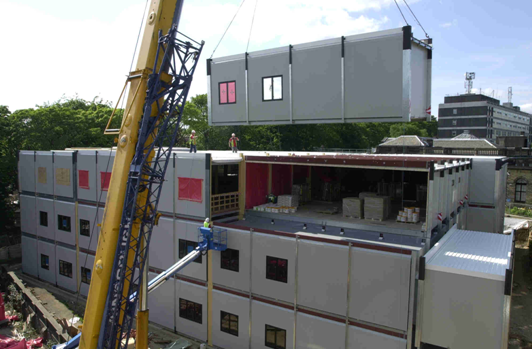 |
| https://www.steelconstruction.info/Modular_construction |
The California Appeals Court concluded that the CGL insurance policy was not limited to risk of damage to third party property. The Court explained that the policy language referred to ‘property damage‘ without any reference to who owned the property. Also there was no impediment to coverage due to the exclusion for "faulty workmanship." There was no indication that the exclusion applied broadly to any damage to the subcontractor's work before project completion.
More specifically, and as a matter of first impression, the Court held that the CGL policy's exclusion for damage to property on which the subcontractor is “performing operations” applied only to damage caused during the subcontractor's physical construction activities. Therefore, this exclusion did not bar coverage for the repair or replacement costs incurred to the units from rain and flooding damage to the units after they were delivered to the site. Although the units were unfinished, because the subcontractor was not working on the units once delivered to the site, the subcontractor was not performing "active physical construction activities." Accordingly the exclusion did not apply.
As for the exclusion of "[t]hat particular part of any property that must be restored, repaired or replaced because ‘your work’ was incorrectly performed on it,” the Court held that "your work" referred only to the specific part of subcontractor's work, not broadly to the general area of the construction site where the subcontractor was working. The Court explained that this exclusion "applies only to the particular component of the insured's work that was incorrectly performed and not to the [subcontractor's] entire project. Here . . .the only arguably defective components or parts of [subcontractor's] work are the plastic tarps, as they failed to keep the water out." Importantly, "there was no allegation the items for which [general contractor] sought repair and replacement costs—the drywall, insulation, framing, and ducting [inside the units]—were defective. [Rather,] those items were acceptable until it rained and they suffered water damage." Accordingly the exclusion did not apply.
The author, Katharine Kohm, is a committee member for The Dispute Resolver. Katharine practices construction law and commercial litigation in Rhode Island and Massachusetts. She is an associate at Pierce Atwood, LLP in Providence, Rhode Island. She may be contacted at 401-490-3407 or kkohm@PierceAtwood.com.
No comments:
Post a Comment